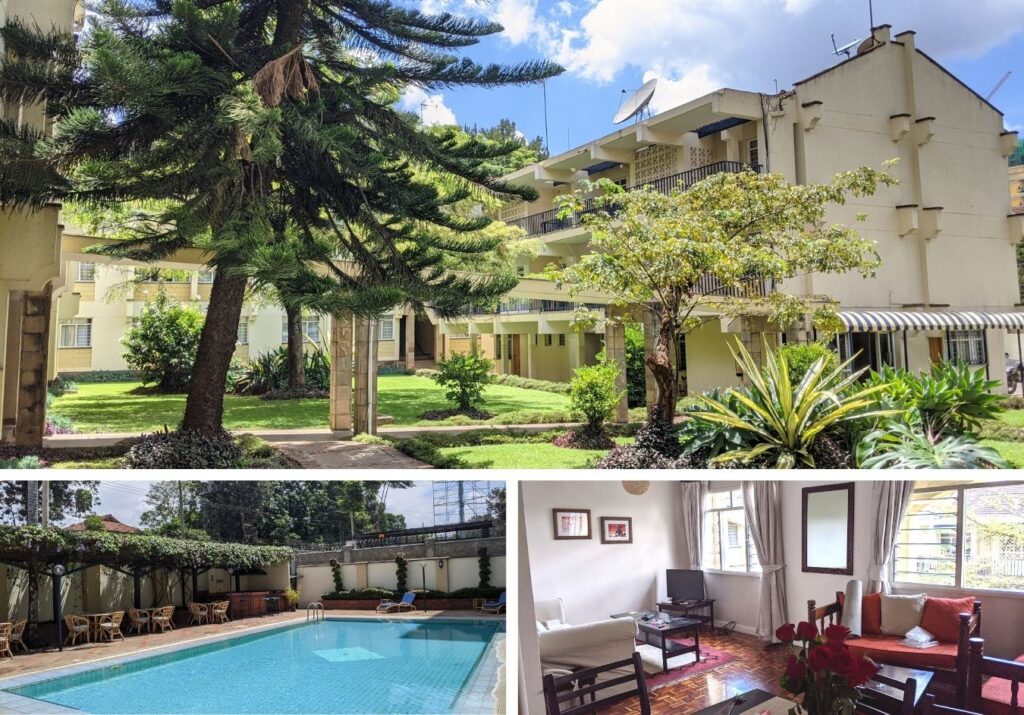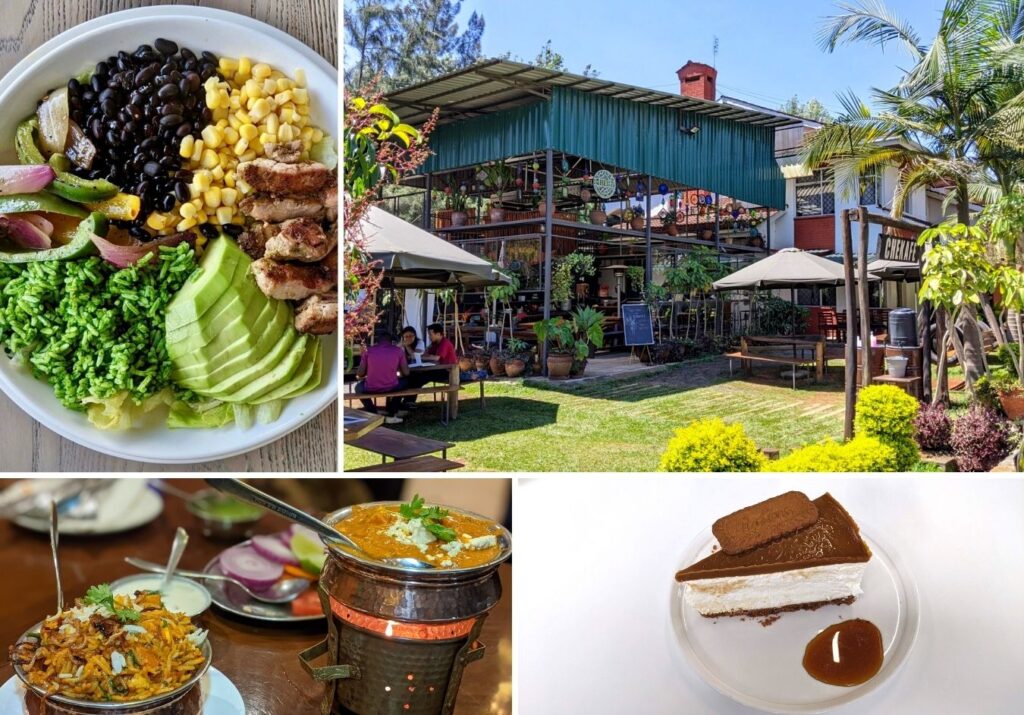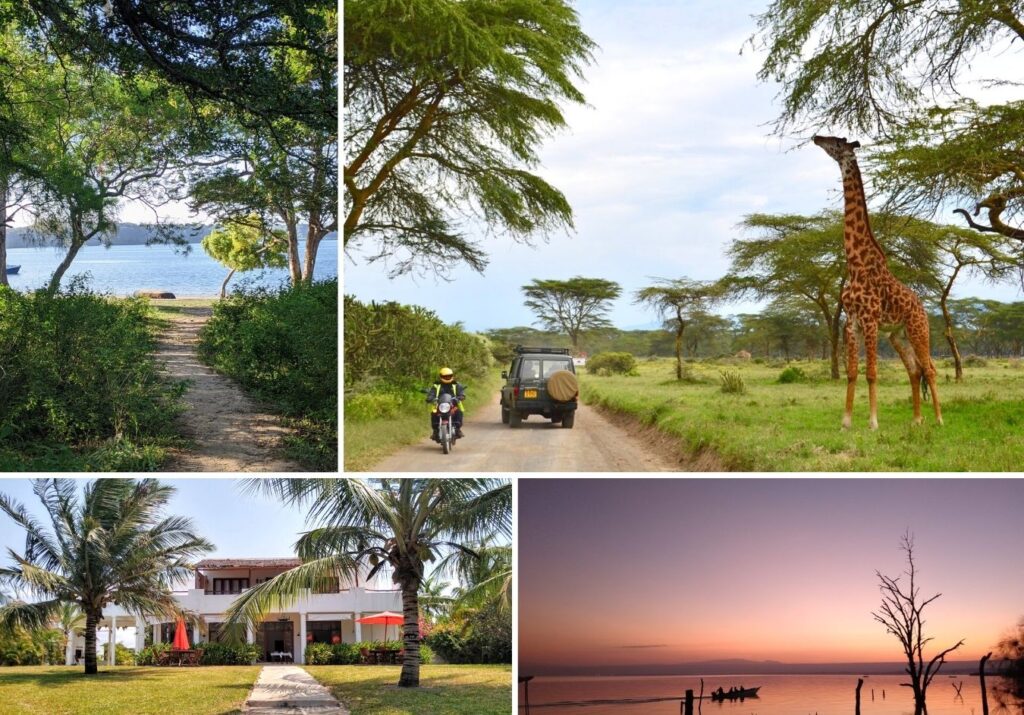Learning the cost of living in Nairobi is vital for anyone moving here. Kenya’s capital is a surprisingly expensive city, and if you don’t know the true cost of certain expenses, you can easily get ripped off.
Since 2019, I’ve been tracking my living expenses in Nairobi every month to see where my money is going and help people like you learn from my experiences.
The following guide is a basic outline of my monthly expenses in Nairobi in the last 3 months. It’s a mix of recurring expenses, one-off purchases, and what I know other people pay for certain things.
Use it as a guide, and it will help you budget for your time living in Nairobi.
My Average Monthly Expenses
Before going any further, it’s important to point out that of cost of living in Nairobi is based on the following factor:
- I work remotely, mostly from home.
- I’m currently living alone in a serviced apartment in the Kilimani neighbourhood.
- I don’t drink alcohol, but I eat out at least once most days (even if it’s just a snack).
- I drink too much coffee, but don’t really track that expense.
- I don’t own a vehicle.
- I don’t have kids.
With that in mind, let’s take a look at my basic living expenses in Nairobi.
| Nairobi Expenses | KES | USD |
|---|---|---|
| Rent | 60,000 | $556 |
| Misc Household Items | 3,776 | $35 |
| Bills, Utilities, Subscriptions | 18,400 | $170 |
| Eating Out | 21,578 | $200 |
| Coffee | 5,395 | $50 |
| Groceries | 21,578 | $200 |
| Insurance | 4,315 | $40 |
| VPN* | 400 | $3.71 |
| Leisure and Entertainment | 3,236 | $30 |
| Transport | 14,000 | $130 |
| Gym membership | 6,000 | $55 |
| Visas** | 5,395 | $50 |
| Total | 163,891 | $1,519 |
* Based on 2-year subscription with NordVPN.
** This is tricky to calculate, so I’ve based it on the cost of tourist visas, renewals, and agency fees.

Housing
For most people, rent is going to be the biggest living expense in Nairobi.
At the time of writing, I’m renting a furnished apartment at Black Rose Apartments in Kilimani. While it’s possible to find cheaper apartments in Nairobi, I pay a premium for several reasons:
- I didn’t sign a lease, which gives me a lot of flexibility.
- My rent includes cleaning 6 days a week, security, and water charges.
- I wanted to live alone, and most apartments in the city cater to families. So nice smaller apartments are more expensive (but that’s slowly changing).
- The location is excellent, with a gym, coworking space, supermarkets, and countless restaurants within walking distance.
- The swimming pool, obviously.
- Apartments advertised and offered to ‘expats’ are usually overpriced, as owners think everyone who moves to Nairobi from Western countries works for the U.N., earns $100,000 a year, and doesn’t actually pay their rent (it’s included in their employment package).
- Rental scams are common in Nairobi, and I’d rather pay a little extra for peace of mind.
In time, I expect my rent to drop as I invest some time in finding a better deal and consider signing a longer lease.
| Type of Home | KES | USD |
|---|---|---|
| Room in Shared Apartment | 35,000+ | $324 |
| 1 Bedroom Unfurnished Apartment | 50,000+ | $463 |
| 1 Bedroom Furnished Apartment* | 60,000+ | $556 |
| 2 Bedroom Apartment* | 70,000+ | $648 |
*Based on my time living in Black Rose Apartments, a complex of serviced apartments.
For more information, read our guide to finding cheap apartments in Nairobi.
Bills, Utilities, Household expenses
| Expense | KES | USD |
|---|---|---|
| Electricity | 7,000 | $65 |
| Water | 3,000 | $27 |
| Unlimited Wifi* | 4,000 | $37 |
| Data, Calls, SMS Package | 2,000 | $18.50 |
| Monthly Laundry Bill | 2,400 | $22 |
| Sub-Total | 18,400 | $170 |
* Based on what I pay for a mobile wifi modem from Telkom.
General Living Expenses
Compared to other major cities around the world, groceries in Nairobi are pretty expensive. But compared to other cities in East Africa, maintaining a healthy, varied diet of home-cooked food in Nairobi is considerably cheaper.
I’m not going to list out what everything costs individually. Instead, I’ve spoken to friends, and we all agree that $150-250 a month is a reasonable grocery budget in Nairobi. If you eat out a lot (like me), you’ll spend less. If you’re super fussy and love cooking elaborate dishes with imported produce from scratch every night, you’ll spend a lot more.
Recently, I’ve started bulk buying frozen curries from Lime Catering and eating them throughout the week. They’re cheap, tasty, healthy, and only take a few minutes to prepare. I’ve also worked out a deal with my cleaner to cook me a range of healthy Kenyan food once a week.
As a result, my weekly grocery bill is getting cheaper, without sacrificing my health.
For everything else, I buy my fruit and veg from a stand outside my apartment, and do a big grocery shop at Carrefour or Chandarana Foodplus every couple of weeks.
Also, I don’t own a car or motorbike and hate traffic, so I never use buses and matatus to get around. As a result, I spend a lot of money on motorbike taxis and Ubers.
The following is a rough breakdown of my grocery, transport, and discretionary expenses in Nairobi. These aren’t exact, and it’s not like I’m buying art and getting tattoos EVERY month – so this is just to give you a sense of how much these things cost.
| Expense | KES | USD |
|---|---|---|
| Groceries | 21,578 | $200 |
| Uber & Moto-taxis* | 14,000 | $130 |
| Gym Membership (per month)** | 6,000 | $55 |
| Men’s Haircut | 1,400 | $12.97 |
| Beard Trim | 300 | $2.78 |
| Books | 3,776 | $35 |
| Clothes | 2158 | $20 |
| Tattoo | 8,000 | $75 |
| Art*** | 6,000 | $55 |
| Custom-mad Side Shelves/Shoe rack | 4,000 | $37 |
* Learn more about getting around in our Nairobi transport guide.
** For more information, read our guide to the best gyms in Nairobi.
*** I’ve started buying some unique African art from my friend Njee at Zanji Art, one of my favourite art galleries in Nairobi.

Activities, Events, and Sightseeing
Even during Covid and occasional lockdowns, it’s easy to have a very active life in Nairobi.
It helps that I don’t drink, so I’m always looking for ways to fill my time with more enjoyable and exciting experiences. And Nairobi never disappoints – there’s always something happening, from events and art exhibitions to hikes, and much more.
Not to mention plenty of cinemas, museums, nature trails, and popup workshops every week.
Once again, the following costs are one-time expenses, not my monthly totals or averages.
| Expense | KES | USD |
|---|---|---|
| Paint and Sip event | 2,000 | $18.50 |
| Cinema ticket | 700 | $6.50 |
| Entrance to Nairobi Arboretum | 60 | $0.50 |
| Museum Ticket | 1,000 | $9.25 |
| Private Dance Classes | 2,000 | $18.50 |
| Group Dance Workshop | 500 | $4.60 |
| Attending Free Minds Sessions | 500 | $4.60 |
| Spa Day* | 9,171 | $85 |
| Entrance to Ngong Hills (for hiking) | 700 | $6.50 |
* Treated myself and a friend to a spa package at the Nairobi Kempinski, purchased from Spa Dreaming.

Food & Drink
And here it is, my biggest expense outside of rent.
I eat out A LOT. I love food, what can I say. And I’m a terrible cook. So I spend a lot of time trying out Nairobi’s many fantastic restaurants.
Unfortunately, Nairobi doesn’t have much of a street food culture. Many of the most popular places to eat in the city cater for the growing middle class and the international community. This is a shame, because you end up spending more than most cities, and Kenyan food is actually really good.
But, you can still have a great night meal for less than $10 if you know where to go – and you don’t drink.
| Expense | KES | USD |
|---|---|---|
| Eating Out (per month) | 21,560 | $200 |
| Meal at a local, Kenyan restaurant | 500 | $4.60 |
| Meal at a mid-range international restaurant | 800-1,200 | $7.40-$11.10 |
| Cup of nice coffee* | 250-500 | $2.30-$4.60 |
* For more information, read our guide to the best coffee shops in Nairobi.
Coworking Costs
Nairobi is chock full of excellent coworking spaces. These days, I mostly work from home and a couple of favourite cafes. But once in a while, I like to work from Workify in Kilimani.
Coworking spaces in Nairobi mainly target corporate clients, startups, and small businesses. They’re less focused on community-building and solo members, which means you should probably skip most of them if you’re joining to meet other people or become part of a community.
As 100,000s of Nairobians become full-time remote workers post-Covid, this will probably change. People here are getting fed up and lonely working from home every day. I also occasionally host meetups and coworking days for members of my Facebook community.
| Type Of Membership | KES | USD |
|---|---|---|
| 1 Month Fulltime | 12,000+ | $111 |
| 1 Month Parttime | 10,000 | $92.67 |
| 1 Day Pass | 1,500 | $13.50 |
For more information, read our guide to Kenya for digital nomads.
Electronics
Working from home and traveling means I’m always buying more electronics and gadgets. Here’s a short breakdown of recent purchases.
| Expense | KES | USD |
|---|---|---|
| iPad* | 37,000 | $343 |
| MacBook Repair** | 5,500 | $51 |
| Tripod selfie stick | 3,500 | $32.50 |
*I buy my Apple products from Mac & More Solutions in Westlands.
** I get them repaired at the Apple Centre in Nairobi CBD.

Travel
Traveling on a budget in Kenya is pretty tough. Visiting the National Parks requires spending a few hundred dollars minimum. Traveling to the coast is much cheaper, but don’t expect to be crashing in backpacker hostels.
However, if you can afford to spend a little more, or travel midweek and during low seasons, there are plenty of deals to be found.
Note: the following prices are for non-residents. If you obtain residency in Kenya, everything becomes much cheaper.
| Kenya Travel Expenses | KES | USD |
|---|---|---|
| Bed in hostel dorm | 1,616 | $15 |
| Budget hotel room incl. breakfast | 3,233 | $30 |
| Mid-range Hotel room incl. breakfast | 6,468 | $60 |
| Room in a nice Airbnb | 6,468 | $60 |
| Budget 3-day safari | 32,339 | $300 |
| Mid-range 3-day safari | 53,898 | $500 |
| One way flight Nairobi to the coast (mid-week) | 3,500+ | $32.50 |
| Motorbike rental per day | 1,500 | $13.90 |
Medical & Healthcare
| Expense | KES | USD |
|---|---|---|
| Medical Checkup | 4,000 | $37 |
| Dentist Visit | 4,000 | $37 |
| Insurance* | 4,310 | $40 |
* I’m covered for emergencies by Safetywing travel medical insurance, which includes coverage for Covid-19.
Final Thoughts
Nairobi is the most expensive city to live in East Africa. That’s true for local residents and foreigners. Even worse, if you’re moving to the city and you don’t know how much things REALLY cost, you can end up paying way more than necessary.
Hopefully, this guide will help you understand the cost of living in Nairobi so you can budget accordingly.
If you think I left anything out or got something wrong, let me know in the comments.

Leave a Reply